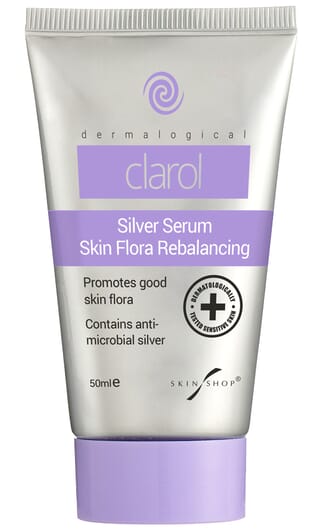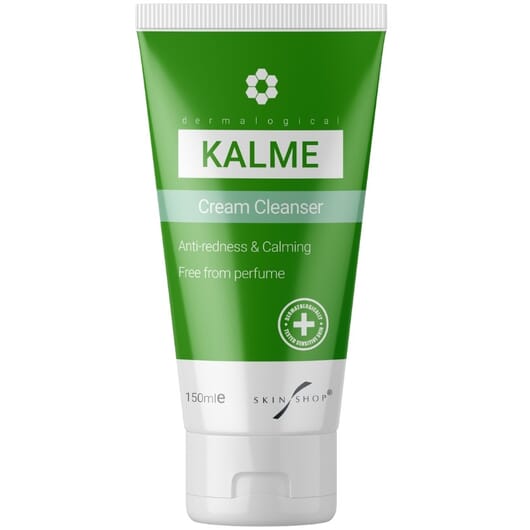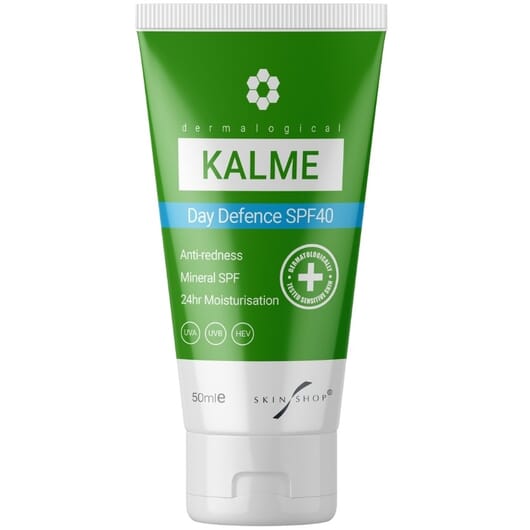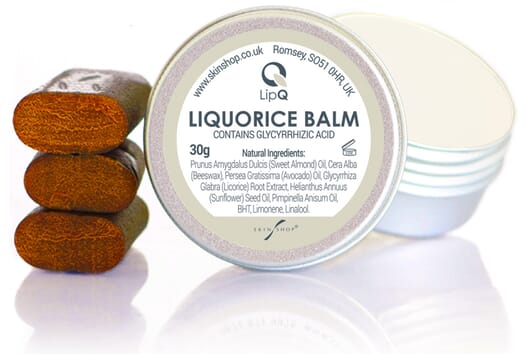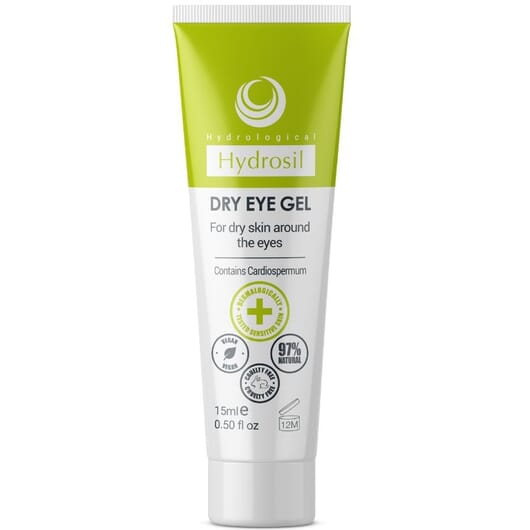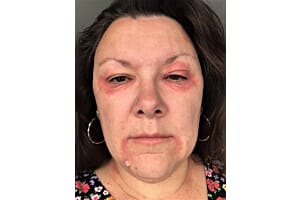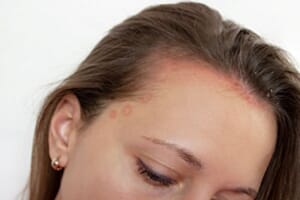Like the seasons, skincare routines should change with the weather and even more so for mature skin.
Mature skin is drier than younger skin and in colder weather the humidity in the air drops and so skin becomes even drier.
Low humidity outside combined with central heating inside too often leads to drier, redder, itchier and flakier skin due to accelerated TEWL (transepidermal water loss) especially for mature skin.
Consultant dermatologist Dr Eva Melegh gives her tips on how to best manage mature skin in winter to prevent additioal dryness, redness and sensitivity.
Stay Protected from Winter Sun
One of the biggest mistales people make is to stop using SPF products in winter. Although it may not seem this way, watery winter sun can be as damaging as summer sun, even when its cloudy, so UV protection is crucial for preserving and protecting mature skin in winter. Cold windburn and UV reflection from low lying clouds can inflame skin sensitivity and increase TEWL and red skin.
Always use an SPF of at least 20 either as a stand along product or as part of foundation or concealing product layered over your base product during the winter months even if the sun is not shining.

Make sure the winter SPF product also contains moisturising ingredients and is suitable for sensitive skin.
I’d always pick a pure mineral SPF over a chemical filter for sensitive mature winter skin as they have a much lower incidence of reaction and are generally kinder to skin and offer physical barrier protection to UV rather than only being a filter. Don’t forget that a mineral SPF is a physical block and so an SPF of 20-25 is the equivalent to a higher chemical filer SPF.
Call in a Creamier Water-Free Winter Cleanser
It’s best to reduce exfoliation in winter to 1-2 times a week if you are prone to dry skin or redness. Instead switch to a daily gentle and water-free cream cleanser to clean skin and avoid washing the face too much with water during thr winter months.
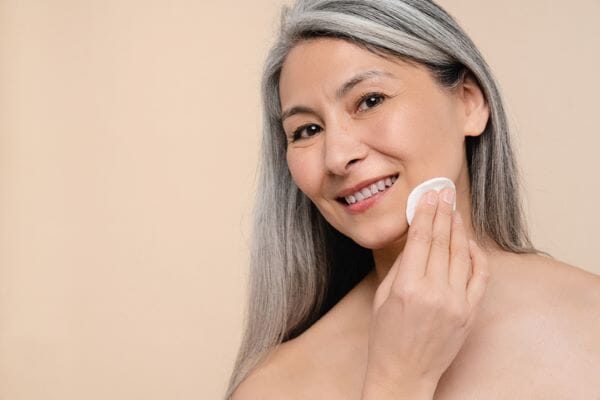
Water can evaporate more moisture from the surface of the skin when it dries making it drier and more reactive. A cream cleanser is gentler and more moisturising on mature winter skin and your skin will thank you for it during the dryier colder months.
Moisturise Under Make-up
In winter it's very beneficial to use a moisturising product under cosmetics even if you are using a tinted moisturiser or concealer. That extra layer of moisture will help prevent mature winter skin from drying out. In summer make up tends ot slide off sweaty skin but in winter, when skin is dier and colder, make up can actually steal moistire from skin so additional moisturising is key to keeping moisture levels optimum.
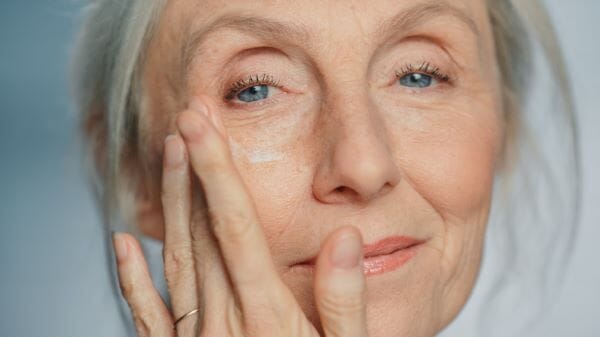
I favour a serum as oppose to a heavier moisturiser for this purpose as it absorbs more quickly and sits better under cosmetics.
Try Kalme TeQ Serum, a super hydrating serum containing an extract of blue agave which is more hydrating than hyaluronic acid and is a natural skin prebiotic which helps repair skin barrier function. It also contains an extract of young caper buds with a proven anti-redness action.
Keep A Close Eye on Winter Eyes
It’s crucial in winter to wear an eye product both day and night as its often the first place where skin becomes drier and more irritated in colder weather, especially in menopausal skin due to the drop in oestrogen which frequently first manifests itself in dry and irritated skin around the eyes and eye eczema.
The skin around the eyes is particularly vulnerable to dryness and inflammation during the winter months due ot watering eyes and cold drying winds and so needs constant protection and hydration.

However, it’s a mistake to put too heavier eye product on mature skin, as they can add to puffiness. Look for lighter formulations to wear under cosmetics that address dryness as well as itching and irritation.
Try Hydrosil Dry Eye Gel which contains a natural plant steroid to reduce itching, redness and inflammation while also offering moisturisation and can be worn under eye cosmetics during the day and under a nighttime eye serum overnight.
Soothe Winter Sensitivity
Dry skin often becomes red skin too in winter as the dryness and cold makes skin more sensitive to temperture chanages leading to more frequent red skin flares as the skin constantly goes from warm indoor conditions to dry cold outside weather.

Reducing sensitivity can be achieved by using a base product applied straight after cleansing with targeted de-sensitising ingredients to decrease the release of pro-inflammatory neuromediators in the skin. This may sound complicated but there are many natural products that help reduce the skin’s sensitivity.
Try Kalme Undercoat, which is a perfume and chemical-free base coat product designed for wearing under other products that contains a naturally sourced de-sensitising ingredient. This not only helps reduce skin sensitivity but provides another layer of moisturisation.
Layer Up Overnight
Overnight is when winter skin becomes most dehydrated due to internal heating. So just a single night skincare product is often not sufficient for dry mature skin during the winter months.
A winter overnight skincare routine should include more than one product with humectant and occlusive ingredients. Humectants draw water to the epidermis while occlusives seal that moisture in and protect it from evaporating.

Aside from a base de sensitising product applied after cleansing, a non-comedogenic oil-based serum with a rich and repairing night cream with antioxidants and essential fatty acids plus layered over the top is an ideal combination for keeping mature skin moisturised all night. If you can find a serum with a prebiotic in it all the better as these help repair skin barrier function overnight to keep moisture locked in.
Effectively moisturised skin should still be flexible and comfortable by morning and not dry or tight.
Slather on Buttery Salve
Salves are a saviour for mature dry skin in winter and should be added to daily skincare routines and used liberally on all areas of rough dry or cracked skin such as elbows, ears, nostrils, eyebrows, knees and feet. are great for dry itchy winter skin.
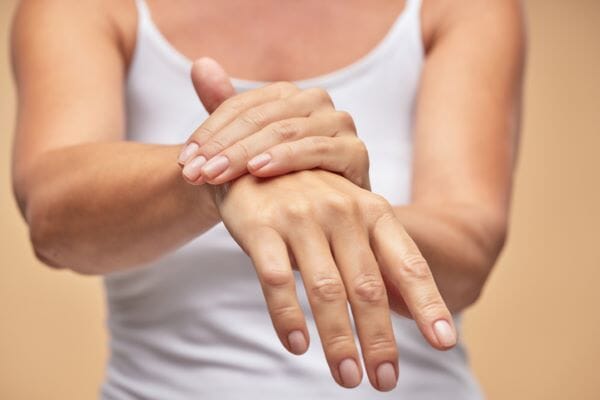
Try Hydrosil Turmeric Butter & Hypoallergenic Milk Salve, a rich salve with naturally active ingredients with anti-inflammatory action for very sensitive dry skin and skin prone to eczema.
Feed Skin Barrier Function
Healthy skin barrier function is the key to keeping moisture locked in. Dryness and inflammation are the two things that weaken skin barrier function most in mature skin.
Skin prebiotics are like food for skin barrier function and help to keep it teaming with good skin bacteria that keeps it more robust against wintry elements.

For mature winter skin, prebiotics are more helpful than probiotics as they are the nutrients the skin barrier needs to stay hardy. Look specfically for products that feed good skin flora.
Keep Lips Lubricated
Lips are one of the first areas suffer when air humidity drops and winds turn colder. Chapped and cracks can appear quickly which can immediately trigger a cold sore outbreak if you are in the 50% of the population that carries the cold sore herpes simplex virus.
Mature lips are also more prone to cold sore outbreaks than younger lips as the lip skin is thinner and more delicate and with age out immunity begins to weaken against all viruses, including teh cold sore virus.
The key to preventing cold sores is to always keep lips extra lubricated and flexible during winter. The best way to do this is to use a natural perfume and colour free lip balm with natural cold sore fighting ingredients in it.
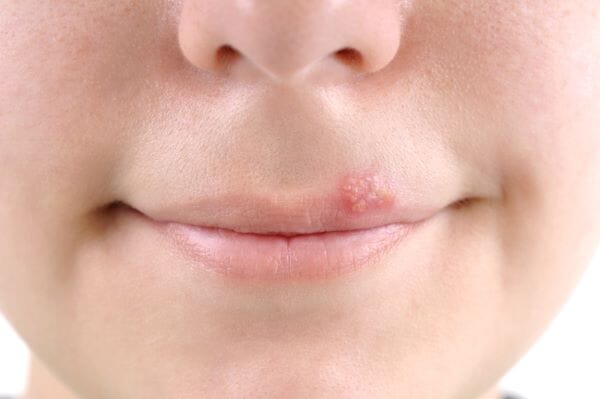
Try Lip Q Liquorice Balm, which contains a natural concentrated extract of liquorice root and is proven by the Herpes Virus Association to reduce the severity and frequency of cold sore outbreaks.
Use the lip balm several times a day, take it with you when you are out and about and keep applying it. Avoid lipsticks in heavy colours or matt versions. If you need some colour just add a little lip stick over the lip balm but wear the balm first and always wear a lip balm thickly applied overnight.




